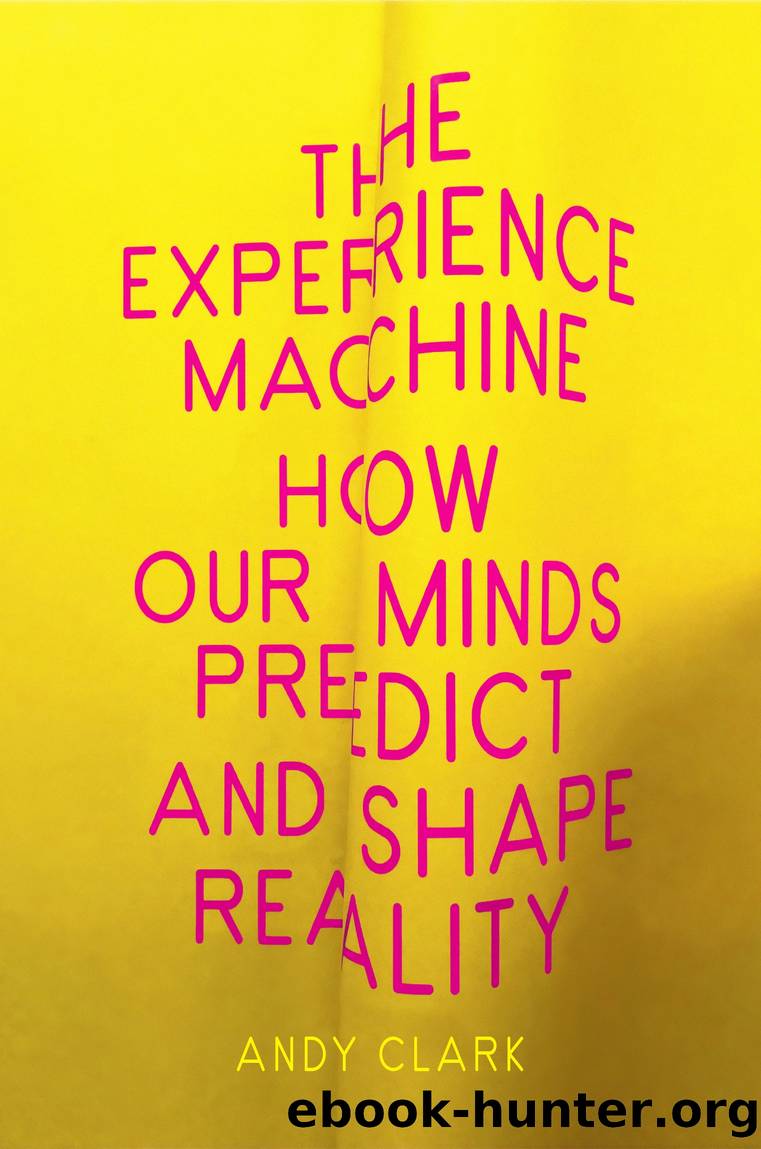The Experience Machine by Andy Clark

Author:Andy Clark [Clark, Andy]
Language: eng
Format: epub
Publisher: Knopf Doubleday Publishing Group
Published: 2023-05-02T00:00:00+00:00
Extended Minds
The philosopher Jerry Fodor once wrote, âIf the mind happens in space at all, it happens somewhere north of the neck.â Fodor emphatically rejected the idea that the machinery of individual human minds could include goings-on in the rest of the body (the bits south of the head) or, worse still, the wider world.
The extremely heretical view to the contrary was pioneered by myself and David Chalmers in a short paper written in the early 1990s, back when I was directing the PNP program at Washington University in St. Louis. One of my first acts as director had been to persuade Chalmers to join us as a postdoctoral fellowâa research-heavy role ideal for such an academic rising star. Dave is now famous for his work on consciousness and (most recently) on how we should think about virtual and augmented reality. But our short paper has become a kind of modern classic and remains one of the most cited papers in contemporary philosophy of mind.
The paper was called âThe Extended Mindâ and in it we argued that the machinery of an individual mind did not have to be restricted to the machinery of that individualâs brain and central nervous system. It did not even have to be restricted to their body more generally construed. Instead, true mental circuitry could indeed be spread out across brain, body, and aspects of the material and technological world. The idea was that under certain conditions outward loops that involve quite mundane goings-on (such as consulting calculators or smartphones or even just looking at things weâve written down in notebooks) could count as proper parts of the machinery of thinking. Your mind, we argued, isnât always all in your head.
At the heart of our argument lay a very simple themeâone that already looms large in our discussions. It is that one of the functions of the biological brain is to create and maintain perception-action loops that keep us alive and that bring us closer to our goals. This requires both storing information using âonboardâ memory, and also actively seeking out additional information as and when it is needed. In this search for good information, it doesnât matter whether the information is already stored in memory or requires the use of bodily actions that loop in various tools and technologies. What matters is just that the right information becomes available at the right moment. Our radical suggestion was that when the weave between the brainâs activities and the functionality of some nonbiological resource becomes sufficiently tight, it really is better to think of that personâs mind as an extended mindâa new problem-solving architecture built from an array of resources spanning brain, body, and world.
The argument we presented involved a general principle (the parity principle) which is best seen as a heuristic, a rough-and-ready tool, for identifying plausible cases of cognitive extension. The parity principle went like this:
If, as we confront some task, a part of the world functions as a process which, were it to
Download
This site does not store any files on its server. We only index and link to content provided by other sites. Please contact the content providers to delete copyright contents if any and email us, we'll remove relevant links or contents immediately.
Sapiens: A Brief History of Humankind by Yuval Noah Harari(14389)
The Tidewater Tales by John Barth(12658)
Mastermind: How to Think Like Sherlock Holmes by Maria Konnikova(7342)
The Thirst by Nesbo Jo(6943)
Do No Harm Stories of Life, Death and Brain Surgery by Henry Marsh(6941)
Why We Sleep: Unlocking the Power of Sleep and Dreams by Matthew Walker(6721)
Life 3.0: Being Human in the Age of Artificial Intelligence by Tegmark Max(5557)
Sapiens by Yuval Noah Harari(5369)
The Body: A Guide for Occupants by Bill Bryson(5096)
The Longevity Diet by Valter Longo(5062)
The Rules Do Not Apply by Ariel Levy(4966)
The Immortal Life of Henrietta Lacks by Rebecca Skloot(4587)
Animal Frequency by Melissa Alvarez(4470)
Why We Sleep by Matthew Walker(4443)
The Hacking of the American Mind by Robert H. Lustig(4381)
Yoga Anatomy by Kaminoff Leslie(4363)
All Creatures Great and Small by James Herriot(4319)
Double Down (Diary of a Wimpy Kid Book 11) by Jeff Kinney(4268)
Embedded Programming with Modern C++ Cookbook by Igor Viarheichyk(4177)
